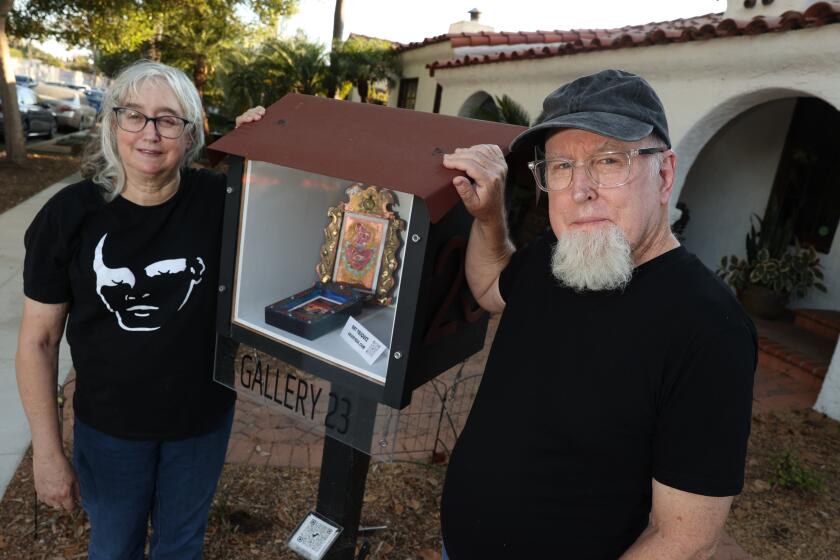Activist Seeks AIDS Quilt’s Return to S.F.
When the founder of the AIDS Memorial Quilt filed a lawsuit here against the Atlanta-based foundation that now owns the 50-ton quilt, he set in motion a legal process that could eventually lead to the return of the huge fabric memorial to the City by the Bay.
The return of the quilt to the city of its 1987 birth is one of the demands in the civil suit filed by Cleve Jones, whose two decades of AIDS activism while he fought the disease himself has made him a living legend in the gay-rights movement in San Francisco and elsewhere.
The complaint was filed last week in San Francisco Superior Court against the Atlanta-based Names Project Foundation, which has custody of the famed piece of folk art and stores it in a gymnasium-size warehouse next to its offices. Jones says foundation officials fired him as the quilt’s spokesman Dec. 31 after he raised concerns that it has languished in the warehouse since 1996, out of public sight and increasingly forgotten.
“The real story isn’t me,” Jones said in an interview. “The real story is the [AIDS] pandemic is worse than ever and this potent weapon [the quilt] is being rendered impotent and irrelevant” by the actions of the foundation.
Jones, who has been infected with the HIV virus since the 1980s, conceived of the quilt in 1985 as a way to illustrate the enormousness of the AIDS crisis, to provide a positive means of expression for those afflicted by the epidemic and to encourage compassion among the public and politicians.
Names Project Foundation Board President Edward Gatta Jr. disputed many of the assertions made by Jones in his lawsuit.
“He was not fired,” Gatta said. Jones refused to meet with foundation officials during the last three months of 2003 to discuss changes in his role as founder and as a result, his salary was cut off at the end of the year, Gatta said.
The foundation has not ended Jones’ health and life insurance, despite suggestions by Jones that officials had threatened to do so, Gatta said.
The foundation remains committed to displaying the quilt, either in part or as a whole, funding permitting, Gatta said. “Our goals remain the same, but there has always been a difference of opinion between the founder and the board,” he said.
Jones, who lived in the mid-’80s in the San Francisco’s Castro District, where AIDS was sweeping through the gay community, encouraged friends and families of people who had died of the disease to sew individual 3-by-6-foot panels, about the size of a grave, to commemorate the lives the disease had claimed.
By 1987, when the quilt had grown to about 2,000 panels, Jones founded the Names Project Foundation in San Francisco and served as its public face while receiving a $41,500 salary and health insurance. Under an oral agreement with the foundation, he said, he relinquished control of the quilt in exchange for the salary and health benefits for life.
In 2001, the quilt was moved from its San Francisco home when the foundation, in a cost-saving move, relocated to Atlanta.
Today, the foundation said, the quilt contains about 44,000 panels, although Jones estimated its size at 50,000. Foundation officials said they receive about 1,300 panels a year commemorating the lives of those dying of AIDS.
In his wrongful-termination lawsuit, Jones, 49, said he was fired via e-mail from the foundation’s Atlanta attorney because he challenged the organization’s direction and decision-making under the leadership of Gatta and Executive Director Julie Rhoad.
Jones said that over the last two years he had pushed the foundation to put the entire quilt on display at the National Mall in Washington, D.C., this October, just before the presidential election. After giving him the OK to start raising the $3 million that would be required to take the quilt to the mall, he said, Rhoad and Gatta did “little or nothing to make the October 2004 display a reality.”
In addition, the pair refused to provide him with the latest financial information on the foundation to help raise corporate and foundation funds for the quilt’s display, Jones said.
The last time the entire quilt was on display in Washington was 1996, “which is a disgrace in itself,” said Angela Alioto, Jones’ San Francisco attorney, a former city supervisor and mayoral candidate.
In addition to asking for compensatory and punitive damages, the lawsuit seeks a court order that would force the foundation to move its headquarters and the quilt back to San Francisco.
Already, Jones and his lawyer said, the lawsuit has had an effect. In a statement, the foundation said the proposed October display of the entire quilt at the National Mall was “not pursued” because an interim $2-million fundraising goal was not reached by a Nov. 15, 2003, deadline imposed by the board.
But the board has “authorized a smaller display of the quilt in Washington, D.C., in 2004 as a kickoff effort to bring the quilt in its entirety to the National Mall within two to five years,” according to the statement.
In addition, the foundation said it was launching a fundraising effort to underwrite a Names Project workshop and a display and visitor center in San Francisco.
Differences are not unusual in such nonprofit organizations. “I still consider Cleve to be my friend,” said Gatta, an interior designer from New Hampshire. “We are always willing to talk with Cleve, always willing to work for a positive resolution.”
More to Read
The biggest entertainment stories
Get our big stories about Hollywood, film, television, music, arts, culture and more right in your inbox as soon as they publish.
You may occasionally receive promotional content from the Los Angeles Times.










